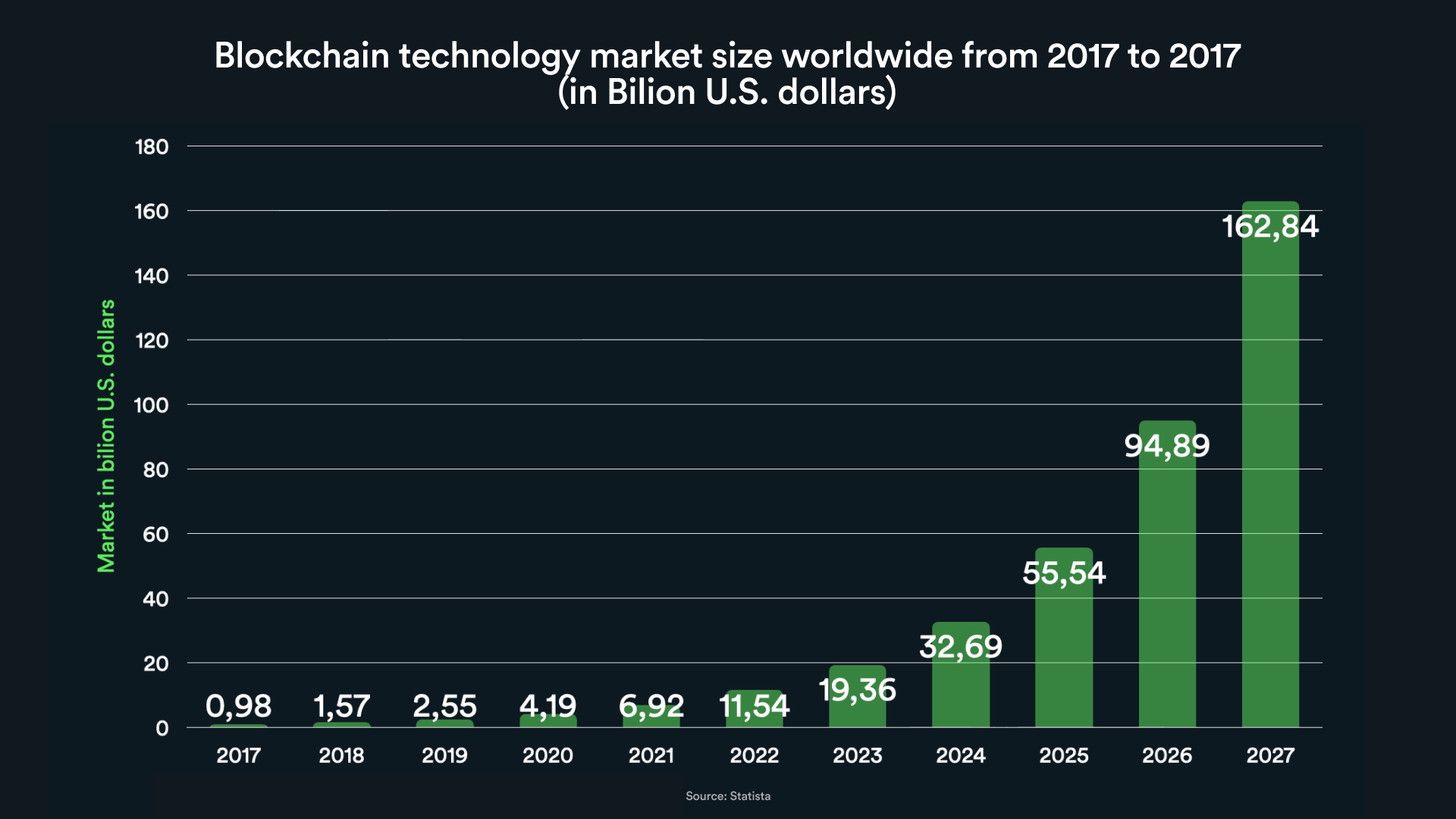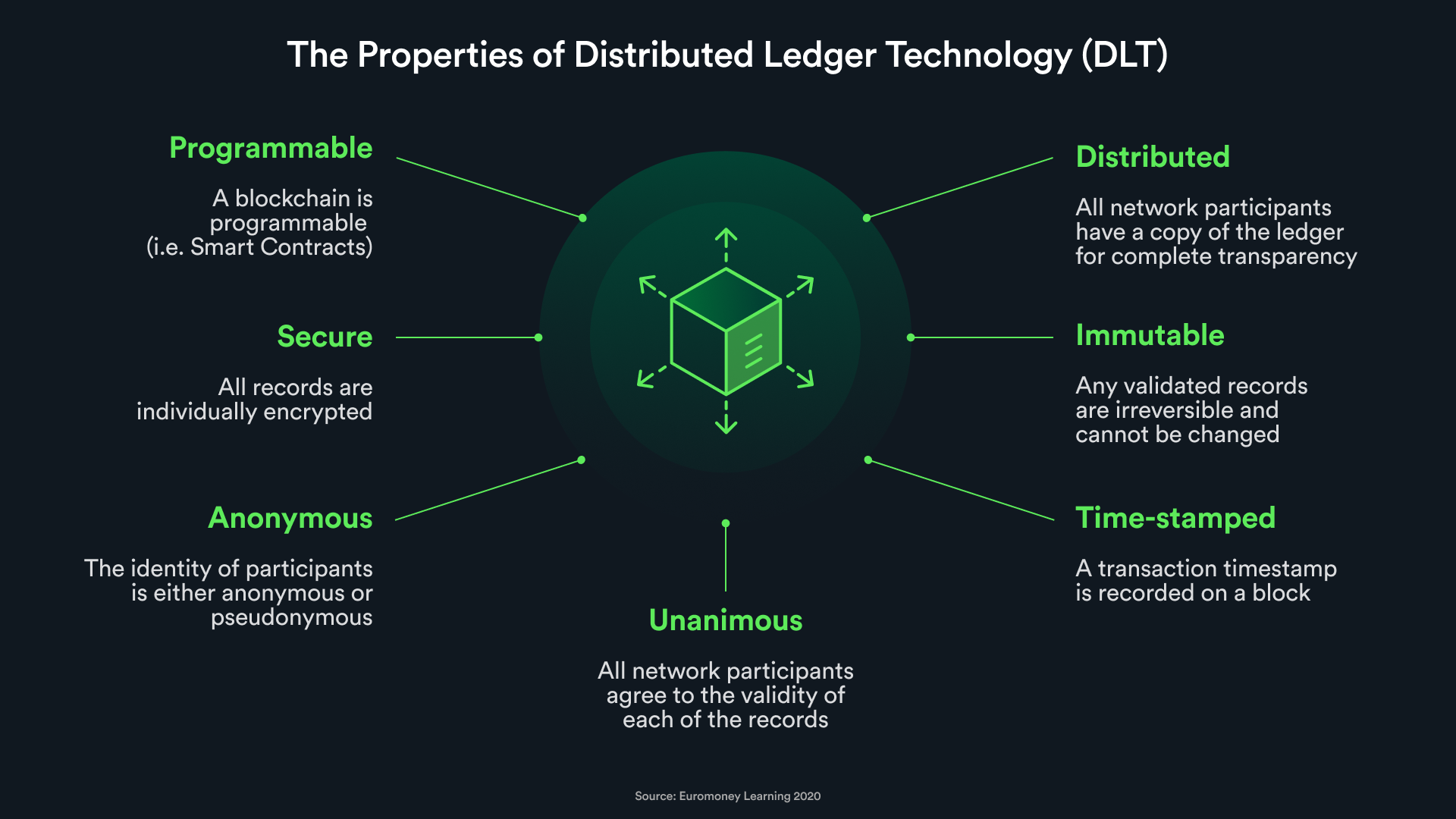Blockchain for Business Part I
A Guide on Leveraging Blockchain Technology for Business
In recent years, blockchain technology has been making headlines for attracting a wide variety of brands, from Starbucks to Visa, the list keeps getting bigger and even more diverse as the time goes on. Blockchain is demonstrating remarkable versatility as a tool capable of enhancing virtually any business model and streamlining processes for greater efficiency. In this article we will go through some of the ways in which enterprise leaders can leverage this technology to achieve their goals and innovate their business, providing insights into the core aims and requirements of implementing blockchain for business.
What is Blockchain for Business?
Before we dive into some of the most popular use cases, let's briefly go through the definition of blockchain and the characteristics that make it a particularly powerful tool for businesses.
Blockchain is a decentralized ledger of all transactions across a peer-to-peer network. This means that this technology allows participants to confirm transactions without a need for a central clearing authority and simultaneously allows authorized participants to gain access to the same set of immutable information.

In this way, blockchain improves efficiency, removes friction and makes up for a way more trustworthy tool to record and share information. It is then easy to see that blockchain’s primary use in the context of a business is the streamline of processes, authenticity and traceability of goods and information, and the facilitation of secure, immutable transactions.
These advantages stem from four key attributes unique to blockchain technology that make them particularly useful for businesses: Consensus, Replication, Immutability, and Security. Shared ledgers are updated only after obtaining validation from all relevant participants involved in the transaction. Approved blocks, representing event records, are automatically distributed across ledgers for all participants, ensuring a unified "trusted reality" of transactions. Once added, blocks cannot be altered or removed, resulting in an unchangeable record of every transaction, thereby fostering trust among stakeholders. Moreover, blockchain restricts block creation and access to authorized entities and trusted partners, creating a secure and controlled environment.

What Are the Use Cases for Blockchain?
Blockchain technology offers a plethora of use cases with the potential to revolutionize the operations of businesses across various sectors. With new applications being explored continuously, it is nearly impossible to predict all the areas that could benefit from this transformative technology. For the purpose of this discussion, we will focus on the most popular areas of application that have emerged in recent years.
Blockchain for Supply Chain Management
One of the most promising use cases for blockchain in business is within the supply chain sector, and it is easy to see why. Through blockchain, companies can create a transparent and secure system that documents the journey of a product from manufacturer to consumer. The transparency afforded by blockchain can help companies better track their products, minimize fraud, and improve customer trust. This is particularly appealing for companies that want to guarantee to their customers provenance of their products, their quality and ethically sourcing. For instance, the diamond giant, De Beers, has been utilizing blockchain technology to track stones from the point they are mined right up to the point that they are sold to consumers. This helps to ensure the diamonds are not illegally sourced - a significant issue in the diamond industry - and reassures customers about the origin of their purchases.
Blockchain Uses for Financial Services
The financial sector is the first sector for which blockchain has been developed. Through blockchain payments can be securely and quickly processed, effectively streamlining international payments and remittances, assets verification and asset registration. This is a particularly important use case for countries and regions where citizens are relying on remittances or are struggling to get access to banking. This is one of the key reasons that blockchain adoption is booming in Latin America, with no signs to stop.
However, blockchain hasn’t only provided a solution to the unbaked but has increasingly been adopted by banks themselves to provide better service. An example is the introduction of the JPM Coin by JP Morgan Chase, a blockchain-based technology, to enable the instantaneous transfer of payments between institutional accounts.
Blockchain in Healthcare
In the past years, that has been a growing concern on the data handling of organizations that handle user’s data, including in the healthcare section. Of course, when they are dealing with such sensitive and private information it is of the utmost importance to guarantee patients that their data are only going to be accessible to their healthcare providers. Blockchain can be a real game changer in this industry since it enables hospitals and other healthcare institutions to store their patients’ data in the most secure way while also making the exchange of electronic medical records more efficient and secure. But data management is just one of the ways in which the healthcare industry could benefit from it. There are plenty of other applications when it comes to prescription traceability, drug traceability, and more!
Blockchain in the Energy Sector
The energy sector is also quickly moving towards blockchain, especially when it comes to renewable energy. Blockchain-based platforms allow these companies to provide their users and producers to trade energy directly and securely, to put in place a peer-to-peer energy trading framework, and even swell excess produces energy directly. Or, as in the case for Enpower, currently building on Aurora, businesses can leverage blockchain to raise capital more efficiently, for acquiring new facilities and return profits for their investors.
Blockchain in the Entertainment Industry
The digitalization of the creator economy has brought about significant changes. While Web2 has opened up new avenues for artists and creators to monetize their work, it has also posed challenges related to ownership, fair compensation, and intellectual property rights. Fortunately, blockchain has emerged as a solution to address these issues effectively. By leveraging blockchain technology, intellectual property rights can be protected, ensuring creators receive fair payment for their work. Additionally, blockchain offers a transparent platform for digital identities and reputation tracking.
An excellent illustration of this is Audius, a music-streaming platform built on blockchain technology. Audius enables artists to publish their works directly and receive equitable compensation for their contributions. Through blockchain's immutable record of digital rights ownership, Audius ensures creators receive the earnings they rightfully deserve. This transformative use of blockchain highlights its potential to revolutionize the creator economy and resolve its inherent challenges.
Audius is just one among many examples. By integrating key features such as intellectual property protection, transparent royalty payments, direct peer-to-peer transactions, decentralized content distribution, digital identity and reputation tracking, and leveraging NFTs (Non-Fungible Tokens) for representing ownership of digital content or collectibles, blockchain offers numerous opportunities for the industry. It is up to you and your business to leverage these properties in the way that best fits your goal and business model!
Wrapping Up
What we've learned so far about blockchain for business underscores its potential to revolutionize various sectors by providing transparency, reducing fraud, and improving process efficiency. So, why is blockchain important for business? It's all about staying ahead in a rapidly evolving digital landscape. Businesses that adopt blockchain technology can gain a competitive edge through increased efficiency, security, and trust.
However, understanding blockchain use cases is just the start. To get your blockchain journey started it’s important to understand what to look for in a blockchain and
This blog provided just a small glimpse into the fast evolving world of blockchain. And now that you better understand the different ways in which blockchain could help you improve your business, in our next blog we will discuss how you can navigate this landscape and get your Web3 journey started. In particular, we will go through deciding whether your business needs blockchain, how to choose the right protocol to build your project and some details on how to take the first steps.
About Aurora
Powered by its high-performance EVM, and fully trustless Rainbow Bridge, Aurora combines an Ethereum compatible experience with the modern blockchain performance of NEAR Protocol. Aurora provides an optimal environment for the creation of scalable, carbon-neutral, future-safe, and low-cost Web3 services, as well as the perfect tools to bring to life your Web3 initiatives. Try Aurora Cloud, our all-in-one blockchain solution for enterprises, and get your Web3 journey started!
Website | Aurora Cloud | LinkedIn | Twitter | Medium | Telegram | Discord | YouTube | GitHub | Regional Communities and Media| Governance Forum | Community Dashboard | Community Swags store | Aurora Expert Bot
